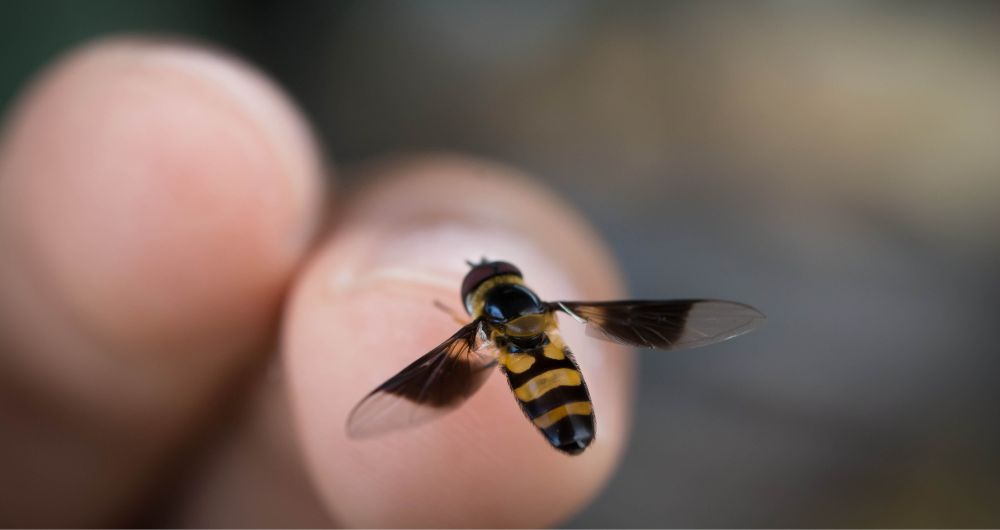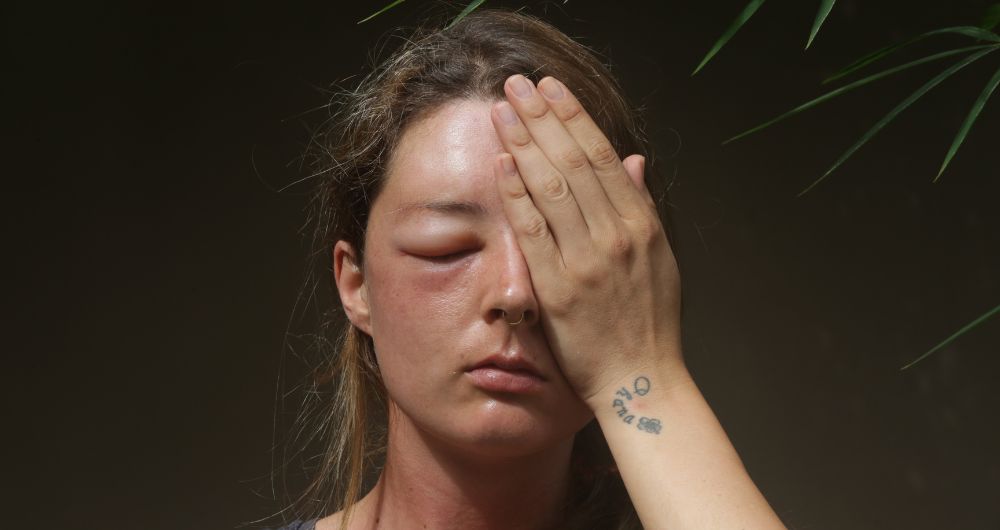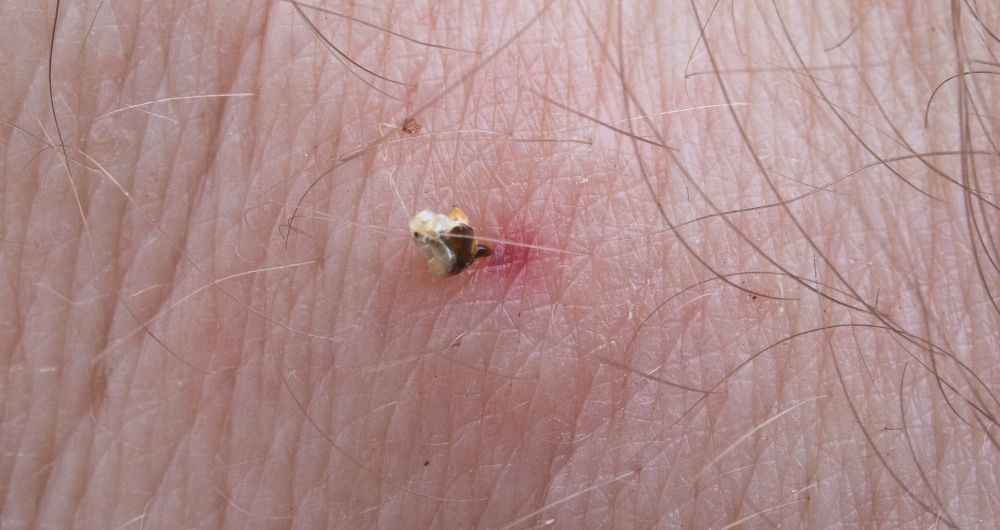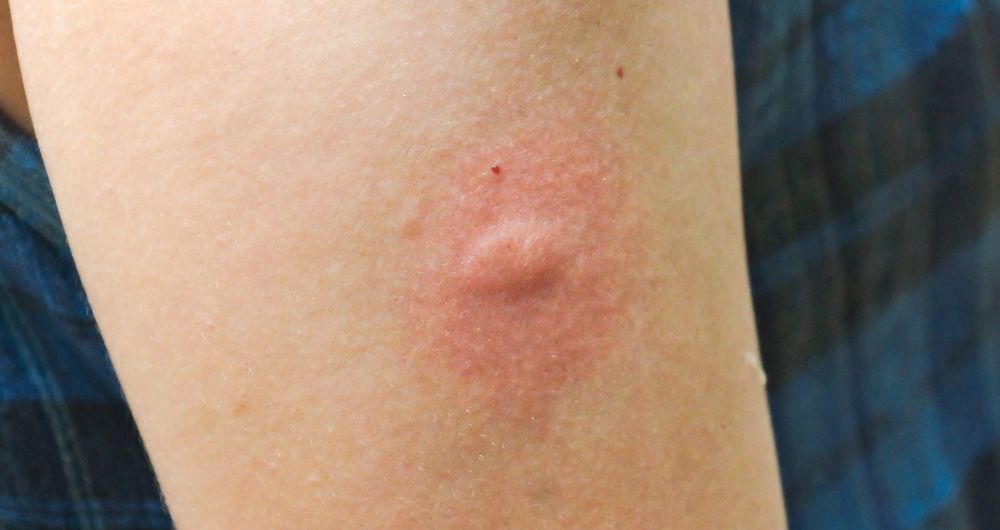
Insect stings are common, especially during the warmer months when outdoor activities increase. For most people, a sting results in temporary pain and irritation. However, for others, an insect sting can trigger a severe allergic reaction that requires immediate medical attention. Understanding the symptoms, causes, and when to seek urgent care in Southington, CT, is crucial for managing insect sting allergies effectively.
What is Insect Sting Allergy?
What Insects Can Cause Sting Allergy?
Symptoms of Insect Sting Allergy
When to Seek Urgent Care for Insect Sting Allergy
Diagnosing Insect Sting Allergy
Treatment Options for Insect Sting Allergy
How to Prevent Insect Sting Allergy
FAQs
Key Takeaways
|

Insect sting allergy is when an individual’s immune system overreacts to the venom injected by a stinging insect. This allergic reaction can manifest in various forms, from localized skin irritation to systemic responses that can be life-threatening, known as anaphylaxis.
It is estimated that about 5% of the population experiences severe reactions to insect stings at some point. This is why it’s essential to understand insect sting allergies, especially for individuals living in areas with high populations of stinging insects.
The common culprits behind these sting allergies include a variety of stinging insects, each with its unique venom composition that can potentially cause allergic reactions.
The most common culprits include:
Bees, particularly honeybees, are one of the primary causes of insect sting allergies. Their venom contains toxic proteins that can provoke allergic reactions in susceptible individuals. Bee stings are especially concerning due to their familiar presence in many environments, from gardens to parks, making encounters likely.
Wasps, including yellow jackets and hornets, are notorious for their aggressive behavior and venom potency. Their stings can cause significant allergic reactions because the venom comprises a concoction of chemicals that can overstimulate the immune system, leading to severe reactions in allergic individuals.
Hornets, a type of wasp, are larger and can be more aggressive, making their stings particularly painful and potent. The venom from hornet stings is highly allergenic and can cause intense allergic reactions, even from a single sting.
Yellow jackets are a common cause of allergic reactions due to their prevalence around human habitats and their tendency to sting in defense. Their venom is similar to wasps and can cause significant allergic reactions, mainly because they often sting repeatedly, increasing the amount of venom injected.
Fire ants represent a unique challenge as they sting and latch onto their victims, injecting venom multiple times. This venom is particularly allergenic and can cause a severe allergic reaction known as anaphylaxis in some individuals. Fire ant allergies are a significant concern in regions where these ants are prevalent.

The symptoms of an insect sting allergy can range widely in severity, from minor discomfort to life-threatening conditions. Recognizing these symptoms is crucial for timely management and seeking appropriate care, such as urgent care in Southington, CT. Below, we explore the common symptoms associated with insect sting allergies.
The immediate sensation after an insect sting is often sharp, sudden pain. This pain is the body’s quick response to the insect’s venom and can vary in intensity depending on the individual’s sensitivity and the type of insect.
Following the initial sharp sensation, the affected area may also experience redness as part of the body’s reaction to the venom. This redness is usually confined to the location of the sting but can spread in more sensitive individuals. Flushing, or widespread skin reddening, can also indicate a more severe allergic reaction. If accompanied by other symptoms like difficulty breathing, immediate medical attention is necessary.
Swelling is another typical symptom of an insect sting, which may occur at the sting site and, in some cases, extend beyond it. For individuals with an insect sting allergy, the swelling can be significant and last several days, often indicating a more severe allergic reaction.
Hives, or urticaria, are raised, itchy welts on the skin that can appear after an insect sting, indicating an allergic reaction in some individuals. These welts can surface anywhere on the body and are often accompanied by intense itching. This itching isn’t limited to the sting site but may extend to other areas, causing discomfort and persisting for some time. This can be effectively managed at an urgent care in Southington, CT, with antihistamines and corticosteroids to relieve the skin symptoms and prevent escalation.
Anaphylaxis, a severe and potentially fatal reaction to insect stings, occurs in about 3% of the adult population. Symptoms of anaphylaxis can include difficulty breathing, swelling of the throat and tongue, a rapid drop in blood pressure, dizziness, and loss of consciousness. Anaphylaxis requires immediate medical intervention. If you suspect someone is experiencing anaphylaxis following an insect sting, immediately seek urgent care in Southington, CT.
Recognizing when to seek urgent care for an insect sting allergy is crucial for preventing severe complications. If you experience any of the following situations after an insect sting, immediately visit urgent care in Southington, CT.
If breathing becomes laborious or wheezy following an insect sting, it’s a sign of swelling or spasms in the airways, a condition medically known as bronchospasm. If not promptly treated at an urgent care in Southington, CT, it can lead to suffocation due to the inability to breathe correctly.
Experiencing joint pain and stiffness after an insect sting is less common but can occur, primarily if the body’s allergic reaction affects more than just the immediate area of the sting. This symptom can indicate a systemic response that may lead to more severe conditions such as serum sickness, joint pain, fever, and hives. Without proper medical attention at urgent care in Southington, CT, these symptoms can persist and significantly impact the individual’s quality of life, making early intervention crucial.
Following a sting, an unexpectedly fast heartbeat or tachycardia might indicate a systemic allergic reaction affecting the cardiovascular system. Urgent care in Southington, CT, can monitor vital signs, administer IV fluids, and provide medications to stabilize the heart rate and prevent shock.
Fever and chills following an insect sting may signal a systemic reaction or infection, indicating the body’s intense effort to combat the venom or an ensuing infection. This response, if unchecked, can escalate into severe complications like sepsis. Early treatment at an urgent care in Southington, CT, is crucial to mitigate these risks.
These gastrointestinal symptoms are caused by the body’s attempt to rid itself of the venom. Without treatment at urgent care in Southington, CT, severe dehydration and electrolyte imbalances can occur, complicating the allergic reaction further.
Some individuals may experience heightened anxiety or even panic attacks, not merely as a psychological response but as part of their physiological allergic reaction. This can exacerbate symptoms, increasing heart rate and blood pressure, potentially complicating the allergic reaction. Professionals at urgent care in Southington, CT, can provide immediate psychological support and medical treatment to alleviate these symptoms and promptly address the emotional and physical reactions.
Identifying an insect sting allergy is crucial for effective management and treatment. Diagnosis typically involves a combination of medical history review, symptom analysis, and specific tests. Understanding the diagnostic process can help seek timely and appropriate care from urgent care in Southington, CT.
The first step in diagnosing an insect sting allergy often occurs through an initial consultation. At urgent care in Southington, CT, a healthcare professional will review the patient’s medical history, including any previous insect stings and subsequent reactions. This discussion helps to identify patterns that might suggest an allergic reaction to insect stings.
Following the consultation, a physical examination may be conducted to assess the immediate effects of a recent sting. This could include observing the severity of swelling, redness, or other skin reactions. Urgent care in Southington, CT, is equipped to perform these examinations and offer immediate relief options.
For individuals with a history of severe reactions or those whose initial assessments suggest an allergy, further testing might be recommended. Skin prick tests or blood tests, available at specialized urgent care in Southington, CT, can confirm the presence of specific antibodies produced in response to insect venom, conclusively diagnosing an insect sting allergy.
After a diagnosis, the healthcare professionals at urgent care in Southington, CT, will guide the allergy. This includes prescribing emergency medication like epinephrine auto-injectors, discussing avoidance strategies, and referring the patient to an allergist for long-term management solutions such as venom immunotherapy.
Urgent care in Southington, CT, can help patients develop an emergency action plan. This plan outlines the steps to take in case of a future sting, including when and how to use medications like epinephrine and when to seek further medical attention.

Managing an insect sting allergy effectively involves knowing the suitable treatment options. Various treatments, whether immediate relief from symptoms or long-term management strategies, are available. Seeking guidance and care from urgent care in Southington, CT, can be particularly beneficial. Here’s an overview of the treatment options for insect sting allergies.
Over-the-counter (OTC) pain relievers can help manage pain and reduce discomfort for minor reactions to insect stings. Medications such as acetaminophen or ibuprofen effectively relieve the immediate pain accompanying a sting.
Antihistamines can alleviate itching, swelling, and hives caused by an insect sting. They work by blocking the histamine reaction in the body, which is a common cause of allergic symptoms. Visiting urgent care in Southington, CT, to quickly access these medications can guide you on appropriate dosages and specific products.
For individuals with a known severe allergy to insect stings, carrying injectable epinephrine (such as an EpiPen) is crucial. This emergency medication can counteract the effects of anaphylaxis, providing a lifesaving measure against severe allergic reactions. Centers for urgent care in Southington, CT, can offer advice and prescriptions for epinephrine auto-injectors.
Venom immunotherapy, or allergy shots from reliable urgent care in Southington, CT, is a long-term treatment option to reduce sensitivity to insect venom. This approach involves regular injections of small amounts of venom to build up immunity over time. This can significantly decrease the risk of a serious allergic reaction to future stings for individuals with severe allergies.
Preventing insect sting allergies involves taking proactive steps to minimize encounters with potentially harmful insects. Preventive measures are essential for those living in or visiting areas like Southington, CT, where outdoor activities can increase the risk of insect stings. Here are several strategies to help avoid insect sting allergies.
Stinging insects often nest in specific areas, including gardens, orchards, and garbage disposal sites. Staying clear of these habitats, especially during peak activity times (typically mid-day to late afternoon), can significantly reduce the risk of stings.
Wearing long sleeves, pants, and closed shoes can provide a physical barrier against stings when venturing into areas where stinging insects are common. Light-colored clothing is less attractive to bees and wasps than bright or dark colors.
Applying insect repellent can deter stinging insects. Products containing DEET, picaridin, or lemon eucalyptus oil are effective. However, follow the instructions carefully, as some repellents may not suit everyone.
Outdoor eating attracts stinging insects, especially sweets and proteins. Keep food and drinks covered when dining outside, and clean up promptly to avoid attracting bees and wasps.
If a stinging insect approaches, remain calm and move away slowly. Avoid rapid movements or swatting at the insect, which can provoke an attack.
Ensuring that windows and doors have tight-fitting screens can prevent flying insects from entering homes, reducing indoor encounters.

Some children may outgrow their insect sting allergies, mainly if their allergic reactions are mild. However, monitoring their condition closely and consulting a healthcare professional at an urgent care in Southington, CT, is essential.
While home remedies can soothe mild reactions, they are insufficient for managing severe allergic responses. For mild symptoms, applying a cold compress can reduce swelling and pain. However, seeking medical intervention from an urgent care in Southington, CT, is essential for signs of a more severe reaction.
In Southington, CT, the most prevalent insect sting allergies are attributed to bees and wasps. These insects are common in the area, especially during warmer months, and their stings can induce allergic reactions in sensitive individuals.
Currently, there is no outright cure for insect sting allergies. However, treatments such as venom immunotherapy have shown effectiveness in significantly reducing an individual’s sensitivity to insect venom, thereby decreasing the severity of reactions to future stings.
Yes, suppose you experience severe symptoms such as difficulty breathing, swelling of the face or throat, a rapid heartbeat, or know you have a history of insect sting allergies. In that case, seeking immediate medical attention at urgent care in Southington, CT, is crucial. Prompt treatment can mitigate severe reactions and prevent complications.
Yes, developing an insect sting allergy at any age is possible. Allergic reactions to insect stings can occur even if previous stings do not respond significantly. Monitoring changes in responses to stings over time is essential for managing potential allergies.
Awareness, prompt action, and effective treatment are key to managing insect sting allergies. For those in Southington, CT, experiencing or at risk of severe allergic reactions, DOCS Urgent Care – Southington provides expert care, offering emergency treatment and allergy testing services. Trust in DOCS Urgent Care – Southington to keep you safe and well-prepared against insect sting allergies. Contact us today and ensure you’re prepared for any emergencies!


During this surge in COVID-19 cases, our primary focus is meeting the high demand for tests, and we are seeing higher than usual wait times. This means we are unable to answer most phone calls. Please know that our teams are working very hard during this time to care for as many patients as safely as possible. Please click the button below for answers to common questions. We appreciate your understanding.